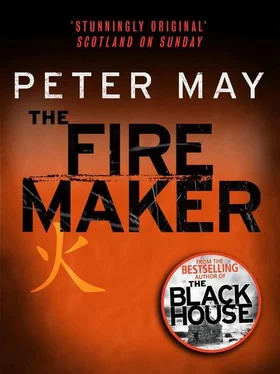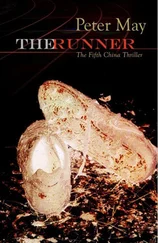They missed their stop at Fuxingmen and had to walk back, past Radio Beijing and Beijing Telecom, crossing via a pedestrian underpass to the dark and decaying south side of the street. The Sanwei, which meant ‘three flavours’, Li explained, had an undistinguished window and a dark entrance behind a bus stop. A board leaning against the wall outside promised a jazz band every Thursday evening. Margaret thought it seemed an unlikely venue. ‘Is this it?’ she asked. ‘A cup of tea in a bookshop? And if we come tomorrow we get jazz thrown in?’
He smiled. ‘The tearoom is upstairs.’
He led her into a small entrance lobby. Down a couple of steps, and through glass doors, was the bookshop, row upon row of shelves lined with thousands of books, assistants idly wandering the aisles. It was not doing much business. They turned left through a door and up gloomy stairs into another world.
Here was a room from another age, peaceful and hushed in its dimly lit elegance, cloistered and unreal, an oasis amidst the humid dereliction of the street outside. From its high ceiling, fans swung in lazy unison, stirring paper lanterns hanging over sets of lacquered dark-wood tables and chairs. Along one side ran a narrow passageway behind a low wall and tall columns. Along the other, ornately carved wooden screens were arranged to create private alcoves. Flowers grew in pots on every available space, vases stood on every table. The walls were lined with both modern and traditional Chinese paintings.
A young girl greeted them at the top of the stairs and led them across the tiled floor to a table in an alcove. There was not another soul in the place. The rumble of traffic was a distant memory, and the air-conditioning took the heat out of the night. The girl lit a candle at their table and handed them each a menu. Margaret was afraid to raise her voice, as if in a church. ‘This place is amazing,’ she said. ‘You would never know it was here.’
‘It’s popular with writers and artists,’ he said. ‘And musicians. It’s very crowded at the weekends, and there is usually music. But in the early week it is quiet.’ His eyes reflected the flickering candlelight like shiny black coals. ‘What would you like to drink?’
‘Just tea.’
He ordered, and the girl brought a tray of delicacies for them to choose from. Margaret picked a small dish of toasted sunflower seeds to nibble on. The tea came in colourfully patterned china cups set in deep saucers and covered with lids. Hot water was poured over a sprinkling of dried green leaves in the bottom of the cups from a heavy, traditionally shaped brass teapot. The girl left it at the table for them to top up their own. The green leaves floated to the tops of their cups, expanding and turning fleshy as they rehydrated. Li replaced the lids. ‘Better to wait a few minutes.’
They sat in silence then for some time. Not a difficult silence, not awkward or self-conscious, but comfortable. Words seemed unnecessary somehow. Li looked at her hands, clasped on the table in front of her. He marvelled at how pink the flesh was beneath the nails, how delicate the fingers that wielded the instruments of autopsy, cutting open corpses to unravel the mysteries of death.
‘What on earth made you want to be a doctor?’ he asked suddenly, almost without meaning to. And immediately he regretted it, fearing she would take offence at his tone.
But she just laughed. ‘Why? Is it so awful?’
‘I’m sorry,’ he said. ‘I didn’t mean to be…’ He tailed off and shook his head. ‘You know, when you told those students I was squeamish about being at autopsies, you were right.’
She looked at him, surprised. ‘But you must have been at dozens.’
‘I have. And I want to throw up every time.’
Which made her smile. ‘You poor soul.’
‘I just can’t imagine why anyone would want to do it. Cutting up dead bodies. Or living ones. In fact, that’s probably worse. Diseases and cancers. People dying all the time.’
‘That’s what got to me ,’ she said. ‘People dying on me. It’s much easier dealing with the dead. You don’t get attached to them.’ She removed the lid from her cup and sipped at the tea. It was still very hot, and wonderfully refreshing. ‘I used to think medicine was vocational. You know, something you were born to. But I’m pretty cynical about it now. Most doctors I know are in it for the money. I’d wanted to be a doctor as long as I could remember. To help people, to save their lives, to ease their pain. But it’s not like that. There’s never enough money, there’s never enough time. When you graduate from medical school you think you know it all, then you find out you know nothing. Whatever you can do, it’s never enough.
‘When I worked in the emergency room at the UIC Medical Centre, I had people in my care dying nearly every day. Stabbings, muggings, poor bastards pulled from car wrecks, kids hit by automobiles, fires, suicides. You name it. They’d come in with arms and legs hanging off. People burned from head to toe, so bad they don’t feel a thing. They’ll sit talking to you, and you know what they don’t — in a couple of hours they’re going to die. They talk about patients in trauma. But half the time the doctors are in trauma, too. There’s a limit to how much of that you can take, Li Yan, before you start turning into some kind of automaton.
‘The dead? They’re gone. Where, I don’t know. But the body’s just a receptacle, and I can be cold and detached and clinical about cutting it up, because whoever that person was is not there now.’
Her tea was cooling, and she took a longer draught of it and nibbled some sunflower seeds.
‘I think maybe doctors must be a little like cops,’ Li said. ‘No home life.’
Margaret flicked him a glance and then looked away again quickly. ‘No,’ she said. ‘No home life worth a damn.’
He took his life in his hands and strayed into that unknown and potentially treacherous territory he had come close to twice before. ‘Is that why you and your husband divorced?’
She met his eye head-on. ‘Oh, we didn’t get divorced,’ she said.
He was taken by surprise, confused and disappointed. ‘But you said you were no longer…’
‘He’s dead,’ she said simply, interrupting.
‘Oh.’ Li knew he’d just stood on a land-mine. ‘I’m sorry.’
‘Don’t be. I’m not.’ But her voice was tight with emotion. She reined it in and kept it to herself for some moments, staring at her hands. Then she said, ‘Michael was a good-looking guy. All the girls thought he was gorgeous, and all my friends thought I was so lucky when we got engaged. So did I. But then, what do you know at twenty-four?’ She took a deep, trembling breath. ‘He was a few years older than me, so I guess I looked up to him. He was so smart, and so passionate about stuff. Especially genetics. And he was always bucking the Establishment, taking the unorthodox view, speaking his mind, even at the expense of his career. That’s why he ended up lecturing at the Roosevelt when he was capable of so much better. I admired him for his principles.’ There was a sad fondness in her smile as she remembered.
‘In the early days we used to sit up talking late into the night, smoking dope and drinking beer and putting the world to rights. Like teenagers. We were big kids, really.
‘But then, life started taking over. For me, anyway. You know how it is. You get your first job. You’re on the first rung of the ladder. They know it, so they work you every hour God gives. You know it, so you do it ’cos you want to climb the ladder. Michael wanted kids, I didn’t. Not then, anyway. There was a lot I still had to achieve in life. I wasn’t about to throw it all away for motherhood. There would be time for that, or so I thought.
Читать дальше












